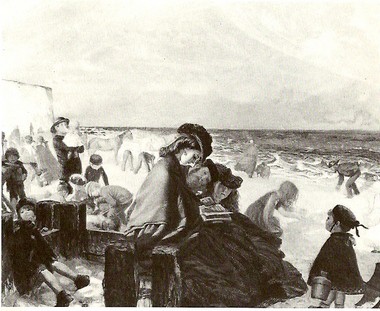Ellen and Jim Have a Blog, Too
We are two part-time academics. Ellen teaches in the English department and Jim in the IT program at George Mason University.


Glimmerglass: Giuilio Cesare in Egitto, 1930s style, from a bookstore · 10 August 08

Arthur Boyd Houghton (1836-75), Ramsgate Sands (1861)
Dear Friends,
I’ve discovered one of the joys of a laptop is I’m not altogether cut off from the Net when in this renovated Victorian home. Last night we saw a marvelous production of Handel’s Giulio Cesare In Egitto at Glimmerglass opera house.
It was brilliantly done. The costumes were suggestively 1930s. Cesare and his men were fascists; Tolomeo and his in African guerilla outfits that were movie-type timeless; Cleopatra wore gowns that were gorgeous and out of movies of the 1930s; Cornelia was an Italian widow; her son a refugee from the Godfather. Since basically (as a thoughtful, entertaining, and fun lecturer before told us) Baroque operas consist mostly of single long arias, the director was wonderfully inventive in stage business for everyone else. The parallels that came to mind were the present wars in the middle east. The singing was outstanding especially the woman who sang Cleopatra, a physically beautiful youngish Russian Lyubov Petrova.
The building is a modern architecturally interesting structure in soft grey woods and is set in lovely green sward with a lake in front.
I was surprized by the prominence given the character of Cornelia. She is a minor character in Shakespeare and the ancient histories I’ve read. So I think that does show that as in many later adaptations of a work new or marginal characters suddenly become very important because they are important in the new culture or to the new artist: the good woman who is punished is clearly important to 18th century sensibilities. In this production a cloth covered her face like a torture victim in Iraq and US prisons. Yvette who majored in music in Sweet Briar did a paper on Handel and said he was also accommodating 2 prima donnas at the time.
The Admiral did his O-levels in music and had to analyze Semele. He accepted the many high voices: mezzo women did Cesare (and was made to look like a man) and Sextus (Cornelia’s son who murders Tolomeo and was made to look like a young woman terrorist so we were on the side of subversives—many kudos for that to the director say I). I missed the variety of having male baritones, tenors and basses. All we had was one counter-tenor (Tolomeo) and one baritone (one of Tolomeo’s officers, in love with Cornelia, tries to save her and is murdered).
A beautiful starlit sky last night and today after pouring rains, a blue sky and warm sun on the porch. Soon I shall put aside Colonna and go sit on said porch and read Patchett’s gift of her knowledge of kindness, a novel about music in its way and also sympathizing with some people labelled terrorists, Bel Canto. The Admiral is there now, enjoying the beautiful scenery while he reads Umberto Eco. Yvette sits inside a blanket and sweater watching the Olympics in the front sitting room. This morning there were men and women on splendid horses in 19th century riding outfits (Australians who live in a land which is the 2nd most English in the white sense, the 1st being New Zealand).
The image comes from a book (E. D. H. Johnson, Painting of the British Social Scene from Hogarth to Sickert) found in a wonderful bookstore we found in Cooperstown (of all places). See comment.
E.M. (posting from Jim’s laptop)
--
Posted by: Jim
* * *
Comment
- On the painting which pictures a scene we could not have (as it poured rain during the day): from Paintings of the British Social Scene by E. D. H. Johnson (which I spoke of last night), Arthur Boyd Houghton was a popular illustrator using the idyllic style so his work is particularly germane to Trollope and (for example) Gaskell’s novels: the gentlewoman reading to a boy is a common motif. First titled Life at the Seaside, when it was exhibited at the Royal Academy of 1854, Queen Victoria saw and fell in love with it. It is a more intimate, variant on Frith’s paranoramic spectacles. It’s just filled with life and energy as well as some depth of feeling. Surface realism mixes with anticipations of impressionists’ motifs of water and sky.
E.M.
— Elinor Aug 16, 12:38pm #
commenting closed for this article
